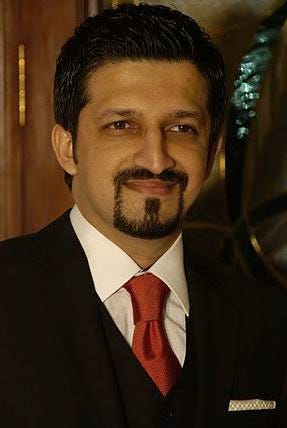Premier League – the global game. How English football is seen in … Pakistan

By Nick Harris
SJA Internet Sports Writer of the Year 4 November 2011 England’s Premier League is, by far, the nation’s most successful sporting export, watched live each week in more than 200 countries, and earning from foreign TV rights alone £1.437bn for the current three-year overseas deals (or £479m a year) as reported by sportingintelligence last year here and here. But who exactly watches? And where? At home? In pubs or bars? What channels carry the games? How much does it cost to subscribe? Why do foreign fans tune in? Is is just popular in a few key markets, or can you really find PL fanatics in Tonga and Papua New Guinea and Gambia and Peru and all points in between? Find out what we’ve discovered so far (A-Z of nations, and listed by continent). Over the coming months, we aim to find out, inviting PL viewers from around world (from as many of the 200+ different countries as possible), to share details of a single game watched. Elsewhere in this series, find out how the League is viewed in: KENYA and AZERBAIJAN and INDIA and SWEDEN and the CZECH REPUBLIC and SERBIA and AUSTRALIA and MONTENEGRO and ISRAEL and MALTA and the U.S.A and CANADA. Without further ado, here ‘s a view of what it’s like to watch the Premier League in . . . . .
.Pakistan
.
*

Name: Ahmed Bilal. Age: 29. Occupation: CEO, Football Media and editor, Soccerlens. Game watched: Chelsea 3-5 Arsenal. Date: 29 Oct 2011. Time: Saturday evening 5.45pm local time (12.45pm lunchtime UK). Where: At a friend's house, in Lahore. You do get people watching together in public places but given that there are no bars, it's more of a personal / social experience than a public one. Who else was watching: Myself and a couple of other friends. Incidentally all Manchester United fans. Which team do you support and why?: Manchester United since 1994. It was a computer game, based on Man Utd. A strange but enduring love. TV Channel carrying the game: ESPN Star Sports, which is a joint venture between ESPN and News Corp (STAR). How much does it cost: I pay 350 Pakistan rupees, PKR, per month to my local cable company that provides us with 80+ channels, including a handful of sports channels. That's US$4 or month or £2.53 a month. You don't get HD, but it's affordable for most people here (i.e. anyone who can at least afford a TV). What's the local tipple and how much does it cost: Fun question. In theory, alcohol is a banned substance, on religious grounds and also by law. Practically, if you are inclined, and you have the money (it's usually 50 per cent to 100 per cent more expensive than what it would cost you in US or UK) and have the right phone numbers, you can get a limited variety of the average stuff. Since it's an 'underground' market demand drives supply and that in turn means a limited selection to choose from. Having said that, it's a lot more common than people think - and if you move in higher circles of society, it's a must. Plus we have our own brewery (Murree Brewery) - again something people wouldn't expect from a country that bans the consumption of alcohol.

One person's preferences don't always reflect local culture but usually drinking for me is more of a social experience, so when I'm watching the game at home it's unlikely to be with a beer or a glass of wine. With friends though, it's a whole different story. What is the popularity of the English Premier League in the country where you live: Absolutely massive. Whereas a decade or two ago international teams still held greater sway (I remember the 1998 and 2002 World Cups being more popular than club football, ie: Premier League / Champions League, you're now seeing a much greater, more widespread interest in the Premier League. Partially it's because the Premier League is always on TV, which is a bit of a self-fulfilling prophecy. There isn't enough Spanish, Italian, German or Dutch football to be seen on TV and that's where you have to commend the marketing machine of the Premier League in getting to international markets first. TV, then, has had a major role to play in promoting the Premier League in Pakistan and it would be easy to say it's the only reason - Pakistan hasn't been the focus of pre-season tours like Far-East Asia or the US, nor have we hosting international / major club teams like India. But there are other cultural factors as well - the prevalence of football as a sport among the youth, coinciding neatly with the decline of several other major sports in Pakistan (including cricket), the strong social ties Pakistan enjoys with the UK in terms of population movement as well as, at the end of the day, the Internet. Before the Premier League football used to be a sport people played. Even growing up, football was more of an athletic / social pursuit first, a game to watch on TV second. The liberalisation of TV channels here around the start of the decade coupled with the sheer explosion of the Premier League and it's success in attracting football fans to a whole new world means that football is easily the second most popular sport in the country (and cricket is rapidly losing its charm). The Premier League has a big role to play in that popularity. Any other observations: UK fans (and many expats) are traditionally supporters of a team because they grew up watching up, or their family supports them, or even because they are the first team they saw in action. But there is a growing section of the global fanbase that has only ever watched football on TV, so their loyalties are formed by initial exposure to the sport. You can almost tell a person's age and time of exposure to football by the team they support. At the start of the previous decade many people started supporting Arsenal (the big team of that time). There was a massive increase in the number of Chelsea fans in the Mourinho years. Barcelona has similarly enjoyed an upswing in support, partly because of their phenomenal success but also because of the likes of Ronaldinho and Messi being idolised by young footballers. Are they glory hunters? Maybe at the start, but a lot of informal research suggests that after a certain period of time supporting a team, a fan will inevitably follow their team through thick and thin and behave like a 'proper' fan. Here's a good article on glory fans that describes this better than me. Another major factor is how players bring new fans to teams, and it's something we've seen here in Pakistan with how Ronaldinho and Messi brought new fans to Barcelona despite Spanish football coverage lagging far behind the Premier League. But is it the chief cause? No - success, exposure and player appeal, all have a role to play. It's a shame that no international football club or team is likely to visit Pakistan in the near future because of the local instability, although like all things on the news there is a lot more propaganda and fear-mongering than reality. I think you would find that, just like everywhere else in the world, Pakistani football fans just want to watch good football, and when it comes to footballing culture, they enjoy being a part of something bigger and more powerful than themselves. It certainly lends to easy friendships ("Are you a United fan? Uou must be alright then"), arguments (all Arsenal fans are pompous and arrogant) and overall, a good social experience. Unless you get beaten 6-1 by Man City, that is. That just numbs you to the core.
———————————
This feature will be updated on a regular basis. Sportingintelligence invites readers who watch the Premier League overseas to send your own experiences to submissions@sportingintelligence.com, answering the questions posed above, and including a JPEG of yourself. We cannot guarantee to use all submissions (although if we’ve not had one from your country it’s almost certain we will) and we’ll be appealing via Twitter from time to time for viewers from specific nations. . Sportingintelligence’s home page today



